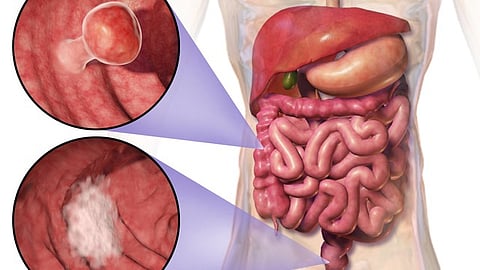

While colon cancer rates are declining in people ages 65 and older, they are increasing by 2% a year in people ages 50 to 54, as well as in people younger than age 50. The American Cancer Society estimates about 106,590 new cases of colon cancer in 2024.
Doctors from Hackensack Meridian Health and the John Theurer Cancer Center are available to talk about the significant screenings and treatments this March, Colon Cancer Awareness Month on a variety of topics including:
Colon Cancer Rates are Rising in Patients Under 50 Years Old- 34 Year Old Fights for Her Life
“I don’t have to worry about colon cancer until I’m in my 50s.” It’s probably one of the most common and concerning misconceptions about this potentially deadly disease. Although that sentiment may have been true decades ago, according to the American Cancer Society, the proportion of colorectal cancer cases occurring in people under age 55 doubled from 1995 to 2019, from 11% to 20%. As you educate your viewers, readers and listeners during Colon Cancer Awareness Month in March, please consider the story of Carla Deschamps; a colon cancer survivor who was diagnosed at 34 years old. Before being diagnosed, Carla admits she had never even heard of a colonoscopy.
“The doctors said you’re not going home. They told me I had colon cancer and needed to schedule me for emergency surgery ASAP,” Carla recalled.
The seemingly healthy school counselor was now in the fight of her life. Her story of strength and healing is both emotional and personal and perfect for Colon Cancer Awareness month! JTCC oncologists are also available to discuss the new research, plus prevention, screening, risks and treatment. See Carla’s full story here.
New Screening & Treatment Options for 2024
Hackensack Meridian Health physicians can also speak about the new colonoscopy prep options - that include taking pills only or consuming a more palatable lemon-lime beverage. “Although a colonoscopy is considered the "gold standard" for colon cancer screening, it’s one of those things that people really dread,” says Rosario Ligresti, M.D., chief, Division of Gastroenterology at Hackensack University Medical Center. Yet it saves lives. Just ask Leonard Croog who says his colon cancer was caught by a colonoscopy on a Thursday and after robotic-assisted surgery, he was home and recovering by the following Tuesday. “It’s like I only had cancer for 4 days,” quips Leonard who says he’s grateful he had the colonoscopy which found the cancer.
HMH physicians can also demonstrate the latest in screening tools like the artificial intelligence (AI)-assisted colonoscopy technology which uses computer-aided detection algorithms to identify colorectal polyps of varying shapes and sizes in real time, facilitating the diagnosis and prevention of colorectal cancer, the second leading cause of cancer-related death in the U.S.
HMH physicians are also familiar with and can speak to the next generation of colon cancer screenings which will include a biomarker blood test that has great promise in detecting all cancers (colon cancer included) in asymptomatic patients.
50 Year Old Man Learns He has Colon Cancer After suddenly passing out - Carin Givens, 50, of Ocean Township, NJ, was enjoying an outdoor summer event with a few friends when he suddenly passed out, resulting in an overnight hospital stay, a battery of tests, and eventually, a colon cancer diagnosis. You can read the full story here.
I’m happy to get you in touch with Givens and his doctors.
Activity, Focus, and Fellowship Have New Jersey Man Back on the Diamond after Colon Cancer
When baseball fan James Morales of Bloomfield, N.J., thinks back on his journey to beating colorectal cancer, he credits two key lifestyle aspects: fitness, and the support of friends.
The first clue something was wrong came just weeks before his 48th birthday, when James noticed rectal bleeding on his way to play baseball, a sport he’s played since boyhood. Less than six weeks later, Morales was at Hackensack Meridian Health’s John Theurer Cancer Center (JTCC) for surgery.
Morales approached the next several months of recovery, quite literally, one step at a time.
“In our neighborhood, we can walk 3.5 miles which is basically a 5K so I was doing that almost everyday. I tried to stay physically fit the whole time.” Morales said.
Morales dedicated his treatment to staying active while connecting with other cancer patients at JTCC over puzzles, playing cards, and meaningful conversations. The rest of his time was spent following the advice of a kind, young woman he met on his first day of treatment: Pick a hobby—something to focus on every day—and run with it.
“I collect Diecast model cars,” said Morales, “and by the end of the treatment, I had collected more than 200! I was trading, selling and buying all around the world.”
Now 54, Morales ended all cancer treatment follow-up appointments and six-month followup scans in November 2023, “graduating” from his recovery period with a clean bill of health.
Morales hopes to give back to the community by mentoring cancer patients with the kind of advice and support he was given. After treatment, Morales got back on the diamond to continue playing the sport he loves. Every spring is a chance for Morales to reflect upon his survival. (Newswise/KV)
